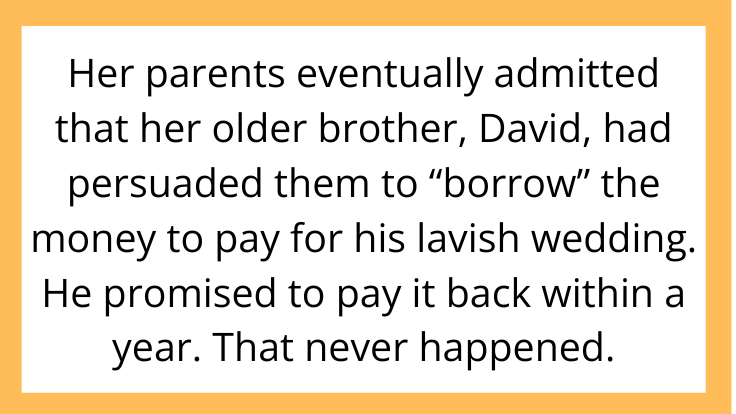AITAH for Refusing to Pay for My Brother’s Honeymoon After He Used My College Fund for His Wedding?
Family can be your biggest support system—or your biggest source of conflict. Today’s AITAH scenario, pulled straight from the kind of stories that light up Reddit threads, explores betrayal, entitlement, and the limits of generosity when it comes to money and family loyalty.
Let’s dive into this real-life soap opera and figure out who, if anyone, is the villain here.
The Background: A College Fund Goes Missing

A 24-year-old woman, let’s call her Emma, shared her story about how her late grandparents set aside a college fund for her when she was a child. This fund was meant to cover tuition, books, and living expenses. Emma’s parents were the custodians of the account, but everyone in the family knew the money was for her future.
Two years ago, Emma was accepted into her dream university. When she went to access the fund, she discovered something horrifying: most of the money was gone.
Her parents eventually admitted that her older brother, David, had persuaded them to “borrow” the money to pay for his lavish wedding. He promised to pay it back within a year. That never happened.
Instead, Emma was forced to take out significant student loans and work two part-time jobs to cover her expenses.
The New Ask: Funding the Honeymoon

Fast forward to this year: David and his new wife are finally going on their delayed honeymoon. They reached out to Emma, asking if she could help them cover costs—airfare, resort fees, and spending money—since they were “still recovering” from wedding expenses.
David argued that Emma is now making a steady income and that “family helps family.” Their parents pressured her, too, saying she shouldn’t “hold a grudge” and that helping her brother would be the “mature” thing to do.
Emma refused, telling them she still struggles financially because of the money they took. David accused her of being selfish and vindictive, and her parents said she was causing division in the family.
Feeling conflicted, Emma turned to the internet to ask: AITAH for refusing to pay for my brother’s honeymoon after he used my college fund for his wedding?
Why Emma Might Not Be the Villain

From an outsider’s perspective, Emma’s frustration is entirely justified. Consider these points:
-
The fund was never a gift to David: It was explicitly set aside for Emma’s education.
-
There was no repayment: David didn’t even attempt partial repayment in the promised timeline.
-
She suffered real consequences: Emma ended up saddled with debt and exhaustion while her brother enjoyed a luxury wedding.
Helping someone financially is a personal choice, not an obligation—especially after they took something meant for your future.
Why David and the Parents Think She’s in the Wrong

On the flip side, David and her parents see things differently:
-
Family resources are “shared”: They believe Emma should understand that sometimes money goes where it’s needed most.
-
Time has passed: They think Emma should have moved on by now.
-
She’s doing better financially: They argue she’s in a position to help, so refusing to chip in feels petty.
In their eyes, Emma’s refusal symbolizes resentment rather than principle.
The Internet Reacts: Overwhelming Support for Emma

When stories like this hit Reddit, they explode with passionate responses—and this was no exception.
Top comments included:
-
“You don’t owe them a cent. You’re already paying for their wedding—literally.”
-
“They stole from you. You don’t ‘move on’ from theft just because time passed.”
-
“Family helping family? He helped himself to your education fund.”
While a few users pointed out that family relationships can be worth more than money, most agreed that Emma had no ethical or emotional obligation to contribute.
The Bigger Issue: Entitlement vs. Accountability

At the core of this conflict is entitlement. David and Emma’s parents expect her to keep sacrificing without ever holding David accountable for taking the money in the first place. Their logic is that since she’s doing okay now, she should be willing to forget the past.
But forgiveness doesn’t mean funding more luxuries. And refusing to enable someone doesn’t mean you’re being vindictive.
Healthy Boundaries and Financial Self-Respect

If you’ve ever been pressured to bail out a family member who hurt you financially, Emma’s story probably feels painfully familiar.
Here are a few lessons we can take from her situation:
-
It’s okay to say no: You can love your family and still have firm boundaries.
-
Debt doesn’t disappear: Just because the event is over doesn’t mean the impact is.
-
You don’t have to set yourself on fire to keep others warm: Prioritizing your own well-being isn’t selfish.
Final Thoughts: Who’s Really the Villain?

So, AITAH for refusing to pay for a honeymoon after having her college fund stolen? Most would say absolutely not.
Emma didn’t create this problem. She’s simply choosing not to participate in a pattern of entitlement. That’s not being vindictive—it’s being responsible.



